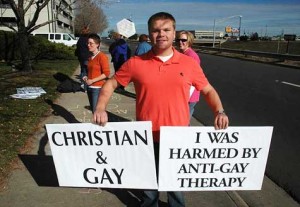Praying That “Praying the Gay Away” Will Remain Unregulated Is Not Going To Help
U.S. District Courts in California have split over whether to enforce a new state statute forbidding the use of homosexual conversion therapy on minors. Homosexual conversion therapy, frowned upon by the American Psychological Association after the Association took homosexuality off the list of mental disorders, aims to turn those who identity as homosexual into “straight” men or women. The law, SB 1172, forbids therapists and counselors from using homosexual conversion therapy or face sanctions from the state licensing board.
Judge Mueller ruled that SB1172 was legal because Christian therapy groups could not prove that merely recommending the therapy would subject the groups to sanctions. Judge Shubb, on the other hand, ruled in opposition in a separate case, but since Shubb’s case was not a class action suit like Mueller’s case, Mueller’s decision will be state policy until a higher court can sort out the contradicting rulings.
California is the first state to pass a law prohibiting the use of gay conversion therapy, but other states are also addressing the issue. In New Jersey, four former patients of such homosexual conversion therapies are suing a conversion group for deceptive business practices. They accuse the group, JOAH, of scamming young men of their money with false promises. Neither the young men nor their parents were warned about the potential of emotional trauma from the use of these therapies. Unlike groups in California, JOAH is a group dedicated to the Jewish community and the plaintiffs are all in their early twenties, not minors.
 Opponents of legal action to these therapy practices assert that they have a First Amendment right to their work. Therapists should be able to express their views to patients under the protection of free speech. Although the use of homosexual correction therapy is against mainstream therapy practices, homosexual conversion counselors argue that they have had some successes and that consumers should have the ability to decide if they want treatment or not. Homosexual rights advocates describe the therapies as discriminatory to homosexuals, but religious groups who believe in these therapies counter that banning the use of conversion therapy is discrimination against these religious groups.
Opponents of legal action to these therapy practices assert that they have a First Amendment right to their work. Therapists should be able to express their views to patients under the protection of free speech. Although the use of homosexual correction therapy is against mainstream therapy practices, homosexual conversion counselors argue that they have had some successes and that consumers should have the ability to decide if they want treatment or not. Homosexual rights advocates describe the therapies as discriminatory to homosexuals, but religious groups who believe in these therapies counter that banning the use of conversion therapy is discrimination against these religious groups.
Although each of these arguments raises interesting points, there are problems with each one. First, therapists engage in a very special kind of free speech. Therapists are not ordinary citizens; they are experts who have a duty to their patients to give them the best advice possible. Patients rely on their therapists to help them, but misleading information could be fatal for patients who are already depressed or suicidal. States have a strong interest in protecting citizens from such harmful practices, as proven by the fact that professional therapy is supposed to be limited to licensed therapists.
Of course, therapy’s usefulness depends on whether homosexual correction therapy is actually a real psychological aid for patients or a hoax to steal money and inflict emotional torment on unwitting victims. The history of homosexual conversion therapy doesn’t inspire much confidence. Conversion therapists have tried everything to “cure” homosexuality, including strip clubs, cocaine, posing naked and prayer (the last one is where the deadpan “pray the gay away” comes from). Results have been mixed at best, with the “ex-gay” movement claiming real success. Horror stories about suicides and insane asylums, however, have called claims of success into question.
Consumer liberty is the most persuasive argument, even if unattached to an actual right. Consumers should have the right to decide if they want to purchase a service or not, without state interference. However, consumers can only make good purchase decisions when they are fully informed. Minors, who the California law seeks to protect, cannot make informed decisions on their own and courts in California have ruled that parents cannot endanger their children through negligent care, not even for religious reasons.
Homosexual conversion therapists rarely inform their patients that the therapy can leave the patient feeling more isolated and depressed than the patient was before therapy. Being told that your parents are the reason you are extremely unhappy can push a person further into depression if the person had previously relied on the parents for support. Since patients of such therapy are rarely aware of the harm they could be subjected to, patients cannot be said to assume the risk, a typical defense when a person voluntary walks into a dangerous situation. Given the potential risks of homosexual conversion therapy and the lack of warnings for desperate patients and desperate parents, limits on the application of such therapy are fully warranted.
Therapy practices are not different from normal medical malpractice suits or product liability, where the question of religion has no relevance. I run the risk of sounding absurd, but if heterosexual conversion therapy is ever conceived, I believe the same rules about product warning or access to minors would also be applied. We should move on the side of caution when tampering with the mind of another person.


Comments